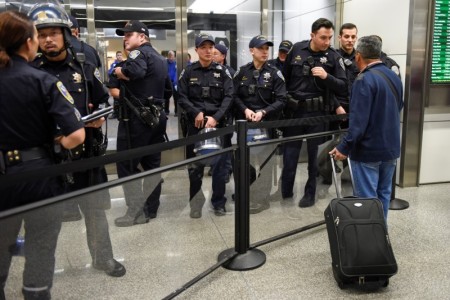72 Terrorists Came From Countries Listed in Trump's Travel Ban, Report Shows

A report on the seven Muslim-majority nations listed in Donald Trump's executive order on immigration – which has been suspended by an appeals court – reveals that at least 72 individuals from those countries have been convicted on terror activities.
Trump's order, which also sought to implement a temporary halt of the U.S. refugee program over security issues, listed Iran, Iraq, Libya, Somalia, Sudan, Syria, and Yemen as seven terror-prone countries whose citizens would have been banned from coming to America for 90 days.
The Center for Immigration Studies, which describes itself as an "independent, non-partisan, non-profit, research organization," reviewed information compiled by a Senate committee in 2016 which identified 72 people from those countries who were convicted of terror cases since the 9/11 terrorist attacks on America.
"These facts stand in stark contrast to the assertions by the Ninth Circuit judges who have blocked the president's order on the basis that there is no evidence showing a risk to the United States in allowing aliens from these seven terror-associated countries to come in," wrote Jessica Vaughan, director of Policy Studies for CIS.
The U.S. reportedly admitted terrorists from all seven nations in Trump's order, with 20 of the convicts having come from Somalia, while 19 each originated from Yemen and Iraq.
The statistics showed that 17 of the individuals came to the U.S. as refugees, while three came on student visas, and one on a diplomatic visa. Moreover, at least 25 of these immigrants were granted U.S. citizenship.
"Thirty-three of the 72 individuals from the seven terror-associated countries were convicted of very serious terror-related crimes, and were sentenced to at least three years imprisonment," the report described.
"The crimes included use of a weapon of mass destruction, conspiracy to commit a terror act, material support of a terrorist or terror group, international money laundering conspiracy, possession of explosives or missiles, and unlawful possession of a machine gun."
Trump's White House is reportedly considering rewriting the executive order, after an appeals court last week upheld a temporary suspension of the immigration order, though the matter continues to be widely debated.
There have been pro-refugee protests at American airports against Trump's ban, but a recent Morning Consult/Politico poll found that over half of Americans do support the order limiting travel from the seven Muslim-majority countries listed.
The poll, which was conducted February 2-4 on a national sample of 2,070 registered voters, and has a margin of error of plus or minus two percentage points, found that 54 percent of respondents to the survey approved of the temporary ban while 38 percent disagreed, and eight percent provided no opinion.
There has also been opposition to Trump's suggestion in an interview with CBN News that he would give Christian refugees in Syria a priority over others, though such language was not included in the executive order.
The Rev. Thomas Reese, a Jesuit who serves on the U.S. Commission on International Religious Freedom, argued that "any proposal that preferences Christians over Muslims as refugees makes Catholic leaders nervous because it feeds that narrative that this is a war between the Christian West and the Muslims."
Others, however, such as Andrew Walther, the vice president of communications and strategic planning for the Catholic fraternal organization Knights of Columbus, told The Christian Post that it would make sense to give special protections to Christians and other minorities specifically targeted by terrorists, as has been the case in the last century.
"In previous cases of genocide, the United States government has prioritized religious minorities who were targeted for genocide, who were refugees, who were displaced, who were in need of humanitarian aid, immigration or resettlement assistance," Walther told CP.
"What we have is an unbroken history of prioritizing people that have been victims of genocide or targeted for genocide. That is a proud tradition for this country."





















